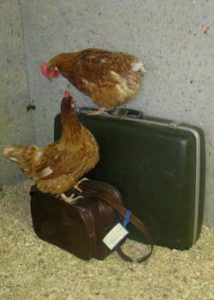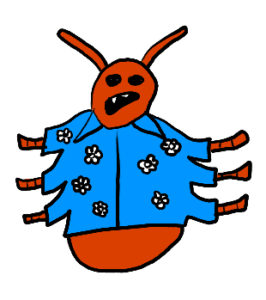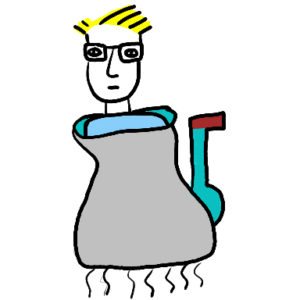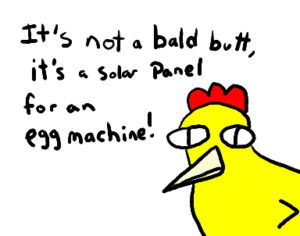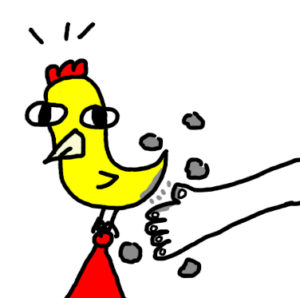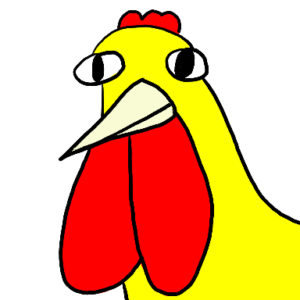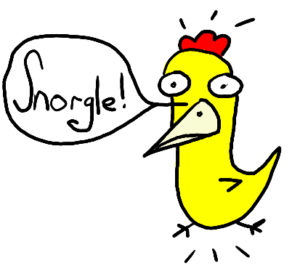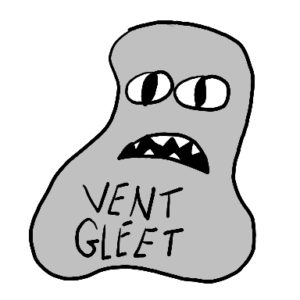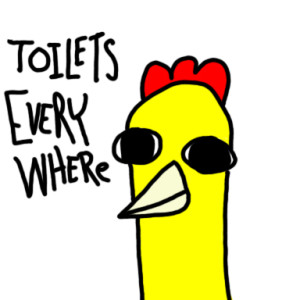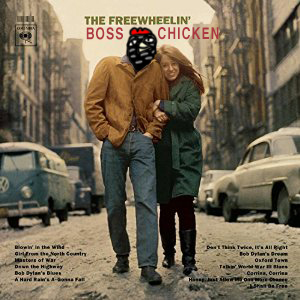Of Mites And Men
June 17th, 2016In spite of everything I do to treat the mites, the damage they’re doing to the chickens’ feathers seems to be getting worse. Steve and John are losing feathers on their backs at a rapid pace. I’ve been powdering them weekly with the “poultry powder,” but I don’t seem to be getting results. I decided it was time to reset the clock, as it were, by completely cleaning the coop and taking it from there. If I could wipe out anything that was living off the chickens, then maybe I could begin to get the things living on the chickens.
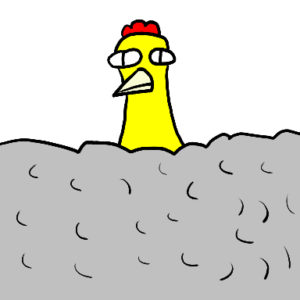
Maybe I overdo the powder a little.
I’ve been a practitioner of the “deep litter” technique from the start of this chicken experiment. Basically, you cover all poop with wood chips, and once a week scoop out the worst of it under the roost, but leave the rest. This creates a sort of compost pile right there in the coop, and that helps keep it a little warmer in the winter. It seemed like a good idea when I read about it, but given my annual mite problems, I’ve begun to wonder if it wasn’t somehow contributing to these problems, by creating a large habitat for invisible bugs. Maybe it is, maybe it isn’t, but it was time for the annual clean out anyway, so I went at it. Usually I dump all the chips, spray the inside of the coop and any of the “furniture” with white vinegar to disinfect it, and then add fresh chips, leaving behind the faint scent of salad. This year, I had to take it a little further. Since I had read about using dishwashing detergent to kill mites, I went in with a bucket of soapy water and a rag first, and wiped everything down, making sure to get it into any cracks. Then I dried that off, and sprayed the vinegar. Then I wiped off the excess vinegar, and sprayed everything again with Poultry Protector. At this point, I figured I had covered all my bases.
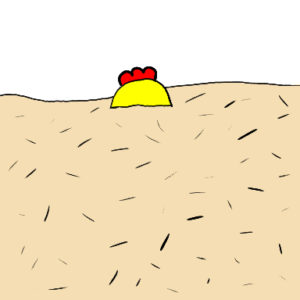
It gets deep.
The biggest surprise was how much diatomaceous earth was in the bedding. There seemed to be a good layer of it under all the chips, so I was amazed that any insect could live in there at all. So either what’s bothering the chickens is getting on them out in the run, or it’s something completely impervious to DE. Hard to say, but the DE may not be cutting it, at least at the level we’re working on here.
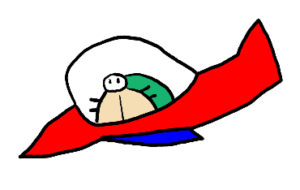
It’s entirely possible they protect themselves in tiny space probes.
I sprayed the Poultry Protector all over the run and outside of the coop as well. The bottle says to get the whole area, so that’s what I did. Of course, it’s not a very big bottle, so I had used most of it by the time I had finished spraying the run, but felt like I had enough to get the birds as well. Supposedly this stuff doesn’t actually kill the mites, but instead keeps them from reproducing. So they may live for a while, but it sounds like they’ll eventually die out. I’m pretty sure not reproducing is why there aren’t any more Shakers, so this should do it, even if it takes a little longer.

If the mites just held a dance like this, they’d be easier to spot. (Those are Shakers, btw. This image is relevant!)
The same night I did the big cleanout, I went into the coop, and instead of dusting the chickens (which I had done the night before), I sprayed each of them in their bald areas with the Poultry Protector. It turns out chickens do not like being sprayed with stuff. They did their usual act of running into the corner of the coop and trying to get behind each other, but this time they seemed much angrier than usual. Luckily I could spray them from farther away, and it went much faster than powdering, so I was done before they revolted. I still have a little spray left, and I’ll use it next time I change out the chips, and this time I’ll be changing them all out, not just the ones under the roost. I think it may be time to try a different approach to coop maintenance and see what works. If I still find that I’m having feather loss, it may be time to try the “flea drop” method, which, unsurprisingly, is controversial on the internet. Basically, you dab some popular flea and tick liquid on the chickens and this does the trick, even though it’s not approved for chickens, and you have to chuck your eggs for a while. This feels like a nuclear option, so I’ll keep dusting a little longer, and see where it gets me, beyond covered in poison dust, of course.
(CREDITS: Theme music: Chicken In The Barnyard by Fireproof Babies, Music Bed: Lu Lu by National Promenade Band)
